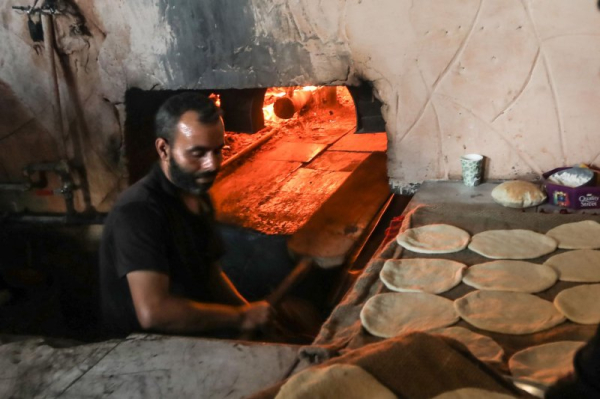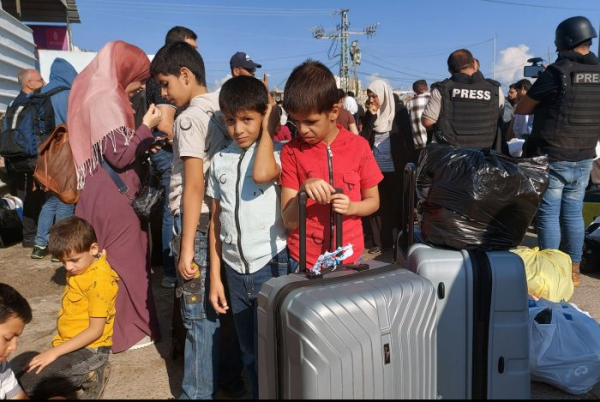
1 of 5 | A Palestinian baker prepares bread in a wood-burning stove at a traditional bakery in the Rafah refugee camp in the southern Gaza Strip on Wednesday. Gaza is experiencing a major electricity crisis because of a shortage of fuel. Photo by Ismail Muhammad/UPI | License Photo
The Israel-Hamas war that entered its second week amid a flurry of diplomatic activity aimed at containing its escalation into large-scale regional combat, shows the ultimate failure and lack of willingness to resolve the Palestinian-Israeli conflict, Lebanese and Palestinian experts told UPI.
While it is hard to predict whether the fighting could open a window of opportunity to revive the deadlocked political process for a peaceful solution to the 75-year-old struggle, it certainly cannot be settled militarily, they said. Advertisement
U.S. President Joe Biden showed firm support for Israel in a visit Wednesday, pledging Tel Aviv would receive everything it needs for its war effort. The United States has deployed its largest and most advanced aircraft carrier, the USS Gerald R. Ford, six other ships and a number of advanced jets to the Eastern Mediterranean. Advertisement
Biden’s visit comes as Israel is preparing for an expected ground offensive against the besieged Gaza Strip, where 2.3 million Palestinians live and have been subjected to unabated bombardment since the Oct. 7 Hamas attack on Israel. More than 3,200 Palestinians were killed and 12,500 wounded in the surprise assault, while Israel’s casualty toll topped 1,400 dead, 4,000 wounded and 199 abducted to Gaza.
The humanitarian situation in Gaza worsened Tuesday, with hundreds killed in a strike on Al Ahli Arab Hospital. Hamas and Israel traded blame for the attack, while Biden backed Tel Aviv’s version. The bombing prompted Jordan to cancel a meeting in Amman for Biden and Jordanian, Palestinian and Egyptian leaders.
‘Second Nakba’
Palestinians and Arab countries have strongly rejected Israel’s call on Gazans to leave the besieged strip for Egypt and pledged to fight any attempt to evict or “transfer” the Palestinians from their homeland.
“No Arab country is going to allow, participate in a second Nakba,” said Rashid Khalidi, a Palestinian-American historian and professor of modern Arab studies at Columbia University, referring to Palestinians’ mass exodus in 1948. “Not only Egypt, but all the Arab countries, Jordan and Saudi Arabia [included], have said the same thing.” Advertisement
The Israeli blockade of Gaza since 2006; the fact that the densely populated strip is mainly made up of Palestinian refugees who were driven from their homes in southern Palestine in 1948, their lands now used by Israeli settlements; and, most importantly, the absence of a political path to peace drove Hamas’ attack, dubbed “Operation al-Aqsa Flood,” Khalidi said.
“These are the underlying reasons for this enormous outbreak of violence.”
He argued that “no political horizon” has been provided to the Palestinians for at least a quarter-century. No serious efforts, internationally or from Israel, were made to resolve the problem of Palestinian dispossession, statelessness and demand for self-determination.
“Nobody in Gaza, in Palestine or anywhere in the world can say, ‘Here is a path for peace, for self-determination, a path to ending occupation and the non-ending expansion of settlements in the West Bank,'” said Khalidi, author of The Hundred Years’ War on Palestine.
He recalled that when Hamas entered into the Palestinian elections process in 2006, its leaders said they were willing to have a 100-year truce with Israel and to have the Palestinian Authority negotiate on their behalf for a two-state solution.
“The response was a resounding refusal by the U.S. and Israel…. That Hamas should turn to violence when all avenues to non-violence are closed, [it is] not entirely responsible.” Advertisement
With the humanitarian crisis in Gaza deteriorating ahead of the anticipated Israeli invasion, the United States must act, said Mustafa Barghouti, the Ramallah-based general secretary of the Palestinian National Initiative and a member of the Palestine Liberation Organization Central Council.
“If the U.S. wants, it can force Israel immediately to stop its aggression and its planned ground operation,” Barghouti told UPI in a phone interview. “But if they don’t do that, the whole region will explode, including [Israel’s] northern front.”
Pressure and threats are being exerted to deter Hezbollah and its sponsor, Iran, from joining the war. However, any such intervention would be determined by developments on the battlefield: a high casualty toll, Hamas’ failure to face an Israeli ground offensive and the forced eviction of Gazans to Egypt, according to the analysts.
Nothing was done to solve the Israeli-Palestinian problem for 75 years, Barghouti said, noting that Israel seized more Arab land during the 1967 war and “is now planning to re-occupy Gaza, expel its inhabitants, annex it to Israel and carry out an ethnic cleansing much bigger than happened before.”
“The international community is responsible for this deterioration and nobody can accept or tolerate another Nakba, another catastrophe that should be three times as large as in 1948,” he said. Advertisement
Barghouti blamed Washington for doing nothing, saying, “Each time they were talked to about [peace talks], they would say time is not appropriate because Israel is not ready. Now Israel is ready for war crimes and genocide.”
Even the Madrid peace conference co-sponsored by the United States and Russia fell short of putting an end to the Arab-Israeli conflict, although it was followed by the Oslo Accords in 1993 and a peace treaty between Israel and Jordan.
The peace process was disrupted by the assassination of Israeli Prime Minister Yitzhak Rabin by a 25-year-old Israeli Jew in 1995.
‘Absolute support’ for Israel
Fares Boueiz, Lebanon’s former foreign minister who was involved in the Madrid peace talks, said if there is an opportunity for peace, the United States and the West should stop their “blind support” of Israel.
“The biggest mistake that the world is committing is this absolute support. Israel will not go to peace if it feels that the whole world supports it, whatever it does… This is leading Israel to more extremism,” Boueiz told UPI. “Any support to Israel should be linked to a real peace plan as was the case with the Madrid conference.” Advertisement
The analysts maintained that as long as the United States refuses to even consider the root causes of the conflict, forcing Israel to end its occupation, to draw back on settlements and accept a Palestinian statehood, violence will remain.
No one is likely to emerge a winner from this war: Israel lost “lots of its aura and invincibility,” Hamas is treated like the Islamic State and the Palestinian people lost the sympathy of the Western world, at least for now, the analysts said.
“The level of support for Israel by politicians and media [in the United States and Europe] … is unprecedented and the pressure on Palestinian cause is also intense,” Khalidi said. “It is too early to say what will be a long-term effect of this…. The degree of barbarian Israel attacks on Gaza may change things around.”
Is a two-state solution still viable?
“No,” Barghouti said. “It was killed by Israel,” leaving one of two solutions: “ethnic cleansing of all Palestinians, which Israel is trying to do…. or one democratic state for all.
“We will not allow Israel to ethnic clean us… we will not accept the life of suffocation … and we will continue our struggle, whatever the price.” Advertisement
Families stranded at Egypt-Gaza border crossing

Families, including those who possess foreign passports, wait at the Rafah Crossing in Gaza, with the hope of moving into Egypt on October 16, 2023. The crossing has been closed since October 7, when Hamas launched an attack on Israel, which responded with persistent airstrikes on Gaza. Photo by Rabee Abu Nqera/UPI | License Photo
ga